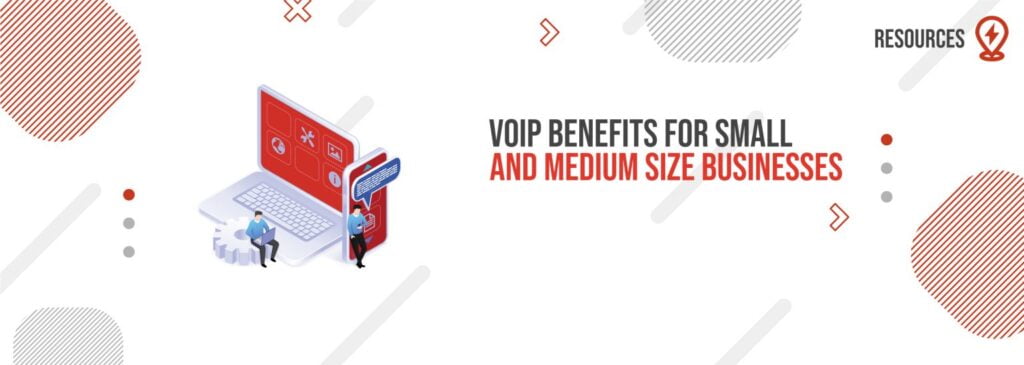
VoIP Benefits for Small and Medium Size Businesses
VoIP can offer several advantages for small and medium businesses, including lower costs, more features, and greater flexibility. When choosing a VoIP provider, consider cost, features, scalability, sound quality, and customer support. VoIP is an excellent choice for businesses looking to save money on their phone system costs or needing more features than a traditional phone system can offer.
Introduction
VoIP services experienced the most widespread adoption between 2008 and 2012. In recent years, there has been a notable growth of VoIP solutions amongst small and medium-sized businesses. Available statistics show that SMBs will grow more than 15% in the VoIP market by 2025.
Limited budgets and increasing remote work trends are two primary factors driving this growth. In 2018, well before the COVID-19 pandemic, 70% of workers worldwide worked remotely at least once weekly. COVID-19 has accelerated this trend; Comcast reported that video conferencing and VoIP usage skyrocketed by up to 285% just a few months into the pandemic.
Research and Markets predict that by 2026, the global VoIP solutions market will be worth $102.5 billion, up from the 2021 $85.2 billion figure. If you’re considering VoIP for your business, you’d want to learn more about how it works and its benefits. This article will explore those topics so that you can decide if VoIP is right for your enterprise.
What Is VoIP?
VoIP (Voice over Internet Protocol) is a technology that takes analog audio signals (similar to those you hear every time you make a phone call) and turns them into digital data that can be transmitted over the internet. The technology makes voice calls over broadband internet possible.
VoIP can be used for both one-on-one calls and group conference calls. To use VoIP, you will need:
● A broadband internet connection – This could be cable, DSL, fiber optic, or even satellite internet. Your upload and download speeds should each be at least one megabit per second (Mbps).
● A VoIP adapter – This converts your regular telephone signal into a digital signal that can travel over the internet. You can get a standalone adapter or one built into your router.
● A VoIP phone – Also called an IP phone, this is a telephone that uses VoIP technology. You can either use a regular phone with a VoIP adapter or buy a phone with built-in technology. You can also use a softphone—a VoIP phone that exists only as software on your computer, smartphone, or tablet.
How Does VoIP Work?
Analog audio signals are made up of waves of different frequencies. The signals must be converted into binary code (1s and 0s) to turn them into digital data. This process is called sampling, and it’s how all digital audio works, whether it’s coming from your computer’s speakers or your cell phone’s earbuds.
When you make a VoIP call, your voice is converted into digital data using (sampling.) This data is broken up into small packets, which are then sent over the internet to the person you’re calling. The receiving VoIP phone or adapter then puts these packets back together in the correct order and plays them through the earpiece so that the person on the other end can hear you.
Where Is VoIP Used?
VoIP can be used for both business and personal calls. Services like Skype, FaceTime, and Google Hangouts are all examples of VoIP applications that people use to make daily calls. However, VoIP is not just for personal use; large and small businesses increasingly turn to VoIP solutions to handle their telephony needs.
VoIP Vs. Landlines
VoIP systems are unlike landlines that only work with a desk phone in your office; you can make and take business calls on VoIP using your laptop, tablet, smartphone (through an app), and some regular phones. Plus, because all VoIP calls go through the internet instead of traditional phone lines, businesses save loads of money—especially on long-distance or international calls. Most providers offer unlimited minutes at no additional cost!
You save money and utilize advanced phone features that otherwise would be unavailable. This includes call waiting, caller routing, auto-attendant, multiple phone numbers, and more from a business VoIP provider. That’s why most small businesses and enterprises are switching from traditional providers.
VoIP Softphones
A VoIP softphone is a software application you can use to make and receive VoIP calls using your computer, laptop, or mobile device. A VoIP softphone looks and works like a regular telephone, with a keypad, microphone, and speakers (or headset.) The advantage of using a VoIP softphone is that it’s more mobile than a regular VoIP phone—you can take it with you wherever you go and use it on any device with an internet connection.
In recent years, softphones have become increasingly popular among business users, even though they’re most often associated with mobile or house phones. According to Dan O’Connell, a Gartner analyst, 30% of employees today use softphones, which he expects will climb by at least 10% yearly. Softphone avails VoIP capabilities to everyone; all they have to do is download a softphone app to their mobile device.
VoIP vs. PSTN
PSTN (Public Switched Telephone Network) is the traditional landline phone network that has been in use for decades. Calls made over PSTN are Analog voice signals that are converted to digital data and then back to analog voice signals at the receiving end by a process called Codec. In the case of VoIP, the voice signal is converted to digital data only once, using sampling, and sent over the internet as packets. This reduces the degradation of sound quality with PSTN due to multiple conversions.
Global telephony trends suggest that most of the physical infrastructure supporting PSTN will be shut down in the next few years. New Zealand and Australia are planning to finish phase-outs of their old telephone systems by the end of this year; customers have barely any time to switch over to IP-based systems.
By 2025, the United Kingdom will have switched off its PSTN, and all its phone lines and connected services will be digital. Ten additional European nations will join by the end of the next decade. This worldwide movement away from the PSTN is coupled with advances in contemporary telephony technology that allow customers more outstanding options to adapt in the future.
VoIP offers digital opportunities to enhance your communication experience. You could, for example, integrate customer relationship management software that would give your team the ability to access pertinent information about a caller before even answering the phone.
And, in contrast to PSTN, you gain value-add services with no extra charge. For example, your staff could immediately access the caller’s name and account history when your business takes an incoming call. You can even fuse VoIP with your business’s systems to ease efficient data transfer and tracking.
What’s more, VoIP is less expensive than PSTN since it makes calls using an internet connection. Because calls are made utilizing existing internet infrastructure, no extra costly hardware or facility installation is needed. You won’t need to buy new desk phones or run wires through your office building or home; instead, you can purchase and utilize VoIP numbers in just a few minutes with nothing more than an internet connection. Unlike the PSTN, there’s no requirement to wait for a service technician to install hardware; everything you’ll require is already available online.
VoIP, SIP, SIP Trunking, and PBX: the Key Differences
SIP (Session Initiation Protocol) is a signaling protocol that controls voice and video calls over an IP network. It is the most common protocol for VoIP calls, although there are others (like H.323). On the other hand, SIP trunking is a type of VoIP that uses SIP to connect an on-premises PBX (private branch exchange) system to the public internet.
PBX is a telephone system used within a private enterprise. A PBX can be either on-premises or hosted in the cloud. Cloud PBX systems are hosted in the cloud and provide many of the same features as an on-premises PBX system, but they’re easier to set up and manage. The critical difference between VoIP and PBX is that VoIP calls are made over the public internet, while PBX calls are made over a private network. PBX systems can be either analog or digital, but VoIP PBX systems are always digital.
In short, VoIP calls utilize internet technology to support voice calling, and Session Initiated Protocol (SIP) is the set of ‘rules’ used to make those calls and connect multimedia sessions. The main distinction between SIP and VoIP? With VoIP, you can solely transfer voice data over the web. In contrast, a SIP trunk can transfer packets of multimedia information, including text messages, voice, or even video. They also function in different mediums.
VoIP calls happen only over the internet or an internal private network, while a SIP trunk can transfer data packets over any network. This includes the ISDN (physical phone network), a VPN, or even the internet.
SIP trunking is a part of the network your calls run on. The protocol is kept in the phone exchange you’ll have at your building and on the equipment of your network provider. You can even request a direct connection to your network provider for more security if you work with sensitive data. VoIP calls, however, are directed from one central location by a separate provider who manages all traffic.
Top Features of VoIP
Many features come with VoIP phone systems, but some of the most popular ones are:
● Call forwarding – This allows you to forward calls to any phone, even when you’re not at your desk.
● Voicemail – Voicemail messages can be played over the phone or emailed to you as an audio file.
● Call waiting allows you to put one call on hold while you take another.
● Conference calling lets you have a three-way conversation with two other people.
● Caller ID – shows you the name and number of the person calling you.
● Call blocking – This allows you to block unwanted calls from specific numbers.
What Equipment Do I Need to Use VoIP?
To use VoIP, you’ll need a few things:
● High-speed internet – You’ll need a reliable internet connection to make and receive VoIP calls.
● VoIP phone or adapter – You’ll also need a VoIP phone or adapter, which is a device that connects your regular phone to the internet so that you can make VoIP calls. Many VoIP providers will give you a free adapter when you sign up for their service.
● Headset – A headset is not required, but it can be helpful if you want to be able to type or do other things while you’re on a call.
You will not need this equipment in scenarios where you’re using a VoIP softphone app; your mobile phone will suffice.
The Benefits of VoIP
Many benefits come with using VoIP for your business, including:
● Cost savings – VoIP is often cheaper than traditional landline service, especially if you make a lot of long-distance or international calls.
● Flexibility – VoIP offers more features and flexibility than landlines, like using your business phone number on your cell phone or setting up call forwarding to any device, even when you’re out of the office. And with a softphone app installed on your mobile device, you can make and receive calls from anywhere.
● Scalability – It’s easy to add or remove lines from a VoIP system as your business grows or shrinks. With a landline system, adding new lines can be expensive and time-consuming.
● Sound quality – VoIP calls usually have better sound quality than landline calls, although this can vary depending on your internet connection.
The Cons of VoIP for Businesses
There are a few potential drawbacks to using VoIP for your business, including:
● Internet downtime – If your internet connection goes down, so does your phone service. This can be problematic if you rely heavily on VoIP for your business communications.
● Security risks – Since VoIP calls are made over the internet, and they may be more vulnerable to security threats like hacking and eavesdropping.
● Setup costs – While VoIP phone systems are often cheaper than traditional landlines in the long run, there may be some initial setup costs when getting started with VoIP. These costs can be largely eliminated when employees install VoIP softphone apps on their mobile devices.
How Much Does VoIP Cost?
The cost of VoIP can vary depending on your needed features and your chosen provider. Some providers offer basic plans for free, while others charge a monthly fee. The average cost of a VoIP plan is around $20 per month, but this can vary depending on your specific needs.
Pay-as-You-Go vs Contract VoIP: Which to Choose?
When choosing a VoIP provider, you’ll need to decide between a pay-as-you-go plan or a contract. With a pay-as-you-go plan, you can cancel at any time and only pay for the minutes you use. This is an especially good option if you’re unsure how much you’ll use your VoIP service or if you’re anticipating a possible increase in use soon.
VoIP vendors who demand contracts will lock you in for a certain amount of time regardless of how little you use the service. Moreover, contracts don’t provide consumers the same degree of freedom as pay-as-you-go VoIP. For example, if customers want to add or remove a service, they may not be able to do so or have to pay more in addition to the contract costs they’d already incurred.
Always thoroughly read the small print in a contract before you sign it. Remember that even if a contract offers reduced pricing, there may be other fees such as policy or cancellation charges. So make sure you are happy with the service and provider before committing to anything. But if you want easy scalability without the added pressure of being locked into a contract, then choosing a pay-as-you option might be the best path for you.
VoIP FAQs
Do I need a particular phone to use VoIP?
No, you can use a regular phone with a VoIP adapter or a VoIP-enabled telephone. You can also just download a softphone app to your mobile device.
What is the difference between VoIP and a regular phone?
VoIP uses your internet connection to make and receive calls, while a regular phone uses a traditional telephone line.
Do I need a fast internet connection to use VoIP?
You will need a fast and reliable internet connection to use VoIP. Otherwise, you may experience poor call quality or dropped calls.
Is VoIP secure?
There are some security risks associated with using VoIP. Still, you can mitigate these by using a secure VoIP service and taking measures to protect your system from threats like hacking and eavesdropping.
What are the benefits of using VoIP?
VoIP offers several advantages over traditional phone systems, including lower costs, more features, and greater flexibility.
Is VoIP the right choice for my business?
VoIP is an excellent option for small and medium-sized businesses looking to save money on their phone system costs. It’s also a good choice for companies that need more features than a traditional phone system can offer.



